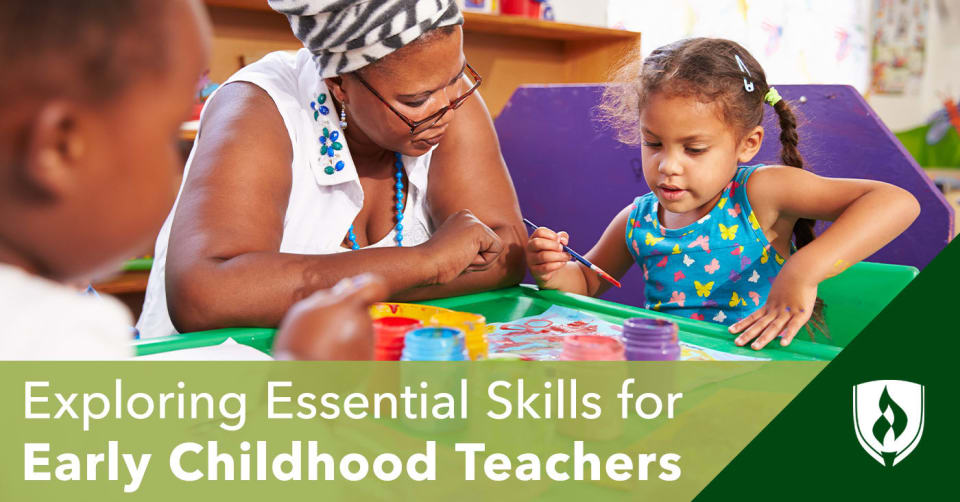
Educators are valuable members of our society. After all, it’s a massively important undertaking to teach the next generation of young learners. You’ve thought about becoming an early childhood educator before, but that’s a lot of responsibility to have on your shoulders. What if you don’t have the skills it takes to be effective? How do you even know if you’d be a good fit for this role?
It’s true that early childhood teachers need to understand child development and the best practices in teaching methods. On top of that, there are certain qualities and characteristics that make some people especially well-suited to working in an early childhood education career.
We’re breaking down these essential skills for early childhood teachers. You’ll discover the difference between the technical skills teachers learn and develop through formal education and the transferable qualities that come in handy in a classroom. You might even be surprised to find that you already have some of these skills under your belt!
The technical skills early childhood teachers need
Early childhood educators are much more than just the people responsible for looking after peoples’ kids. Just like professionals in any other field, they need training and specialized skills to do their work well. So what are employers looking for? We analyzed more than 9,600 early teacher job postings to identify some of the most sought after skills and abilities for these roles—here’s what we found:1
- Child care
- Child development
- Lesson planning
- Cardiopulmonary resuscitation (CPR)
- Special education
- Creating a nurturing environment
- Scheduling
- Customer service
- Progress reports
- Music
What if you don’t already know how to plan a lesson or work with children who have special learning needs? Not to worry! A high-quality Early Childhood Education program can help you develop these skills and more so you’re prepared to take the lead in a classroom setting.
Other valuable qualities to bring to the classroom
The technical skills above are important in an ECE career, but we all know that there’s more to being a good teacher than planning lessons and activities. The best teachers also have a strong mix of “soft” or transferable skills and natural traits to round out their technical know-how. Let’s dig into some of the most common.
1. Strong communication skills
Young children don’t always know how to express themselves or communicate their needs—that’s just one reason why ECE teachers need their communication to be top-notch! They’re serving as one of the first examples of strong communication for the children in their care.
Teachers also need to communicate with their coworkers and students’ parents. “Parents want to know as much as they can about their child’s day and how they are progressing in their development, so it is essential that teachers know how to communicate calmly, clearly and professionally with the parents,” says early childhood literacy specialist Elise Trudel Cedeño.
2. Creativity
ECE professionals use creativity on a daily basis, and not always in the ways you might expect! Imagine making up a silly game on the spot to keep kids busy when there’s an unexpected delay in the schedule, or finding fun ways to encourage a child to clean up their blocks when they’re done playing. ECE professionals do this type of creative thinking all day long!
Teachers who model creativity can also help light the creative spark in the children they teach. The National Association for the Education of Young Children (NAEYC) shares that open-ended art projects can help kids regulate their emotions, develop fine-motor skills and boost their literacy and cognitive skills. If a teacher shows a love of the creative process, students will feel the freedom to explore their own creative projects.
3. Organization and planning
It’s true that kids learn through play, but that doesn’t mean every day in an ECE classroom is a free-for-all. Routine and structure are not only part of a good classroom management strategy, they also help children to feel safe in their environment because they know what to expect throughout the day.
Planning a strong curriculum based on research and developmentally appropriate practice is key, according to Trudel Cedeño. Being organized and having strong presentation skills can also improve team meetings with your fellow teachers, “so that your students are receiving quality, research-based education and excelling in their developmental milestones,” Trudel Cedeño says.
4. Relationship building
Young children have a lot of big emotions, and they’re still learning how to handle them. Toddlers and preschoolers may show behaviors like biting or throwing a tantrum when they aren’t sure how to deal with their feelings. Teachers who can display empathy and build relationships with their students will be in a better position to help them calmly work through their emotions.
There’s also evidence that infants and children with a secure attachment to their caregivers, including teachers, have a leg up in reaching cognitive developmental milestones. Secure attachment develops when teachers are tuned in to a child’s needs and respond appropriately. Teachers with strong relationship-building abilities are in a good position to create these positive bonds with their students. Along with relationship building, check out professional ECE associations.
5. Enthusiasm
It’s no surprise to see this soft skill on the list! Young children have boundless energy, and ECE teachers need plenty of their own if they’re going to keep up with them. Energy and enthusiasm isn’t just necessary for physical tasks around the classroom. It also takes energy to be patient and maintain a cheerful mood, especially if children in the class are having a difficult day.
There are plenty of ways to increase your energy even if you don’t usually consider yourself a high-energy person. Simple habits like getting enough sleep, drinking plenty of water and exercising regularly can help you keep the pep in your step when you’re leading a classroom.
6. Collaboration
Most ECE professionals aren’t working on their own. Teachers in child care centers or preschools work with teams of other pros to lead the classroom. Some home child care providers even hire an assistant to help out!
Being able to collaborate with others and work on a team is an important part of this career. Teachers must be on the same page about teaching philosophies, school policies and each child’s individual needs. With a common goal of helping children grow and learn, ECE teachers can work together to create a supportive classroom environment.
Level up your early childhood teaching skills
Despite their size, building up the next generation of young learners is no small feat. It takes a lot to be an effective and knowledgeable leader in the classroom. While a few of these things might come naturally to you, the rest can be refined with formal training. Learn more about your options in the field in our articles, “What Can I Do With an Early Childhood Education Degree?”
Relevant Articles:
- What Can You Do With an Early Childhood Education Certificate? Exploring Your Options
- 6 Signs You Have What It Takes to Become a Childcare Provider
- What I Wish I Knew Before Starting My First Early Childhood Job
- Speech Delay in Toddlers: What ECE Professionals Should Know
1Burning-Glass.com (analysis of 9,625 early childhood teacher job postings, May 01, 2019 - Apr. 30, 2020).




